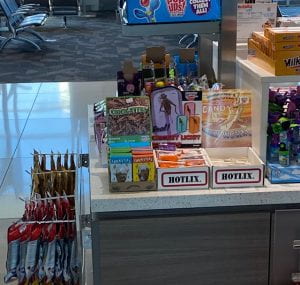Well, readers, this is it-the final blog post for this trip! I had such an amazing experience, and I was definitely sad to leave! It was really weird getting to the airport and seeing the other people leaving, knowing that they probably had a very different experience in Belize than we did. Namely, I did not see anyone else not belonging to our group with as many bug bites! Although I’m sure that the other tourists also got to enjoy Belize’s natural habitats, I really appreciated the in-depth look we got at different organisms in both the reef and the rainforest.
One important thing I learned from the course and had the opportunity to observe myself is how similar the rainforest and the reefs are. For example, both the rainforest and the reef had a huge amount of biological diversity, which as we learned in the course, is paradoxical with the deficiency of available nutrients. What we learned is that in both ecosystems, the nutrients are held in living biomass, and this scarcity creates organisms that are evolved to live in super specific niches within the ecosystem, or they specialize such that they are completely dependent on one particular interaction. One example of this is the symbiotic relationship between the coral animal and the zooxanthellae that they host, or that between the leaf cutter ants and the fungus they cultivate. Another similarity is the competition for light. In both ecosystems, organisms must do photosynthesis to produce nutrients, leading to a competition between the different photosynthesizing organisms to access the sun’s rays. The trees in the rainforest will grow taller so that their canopies can extend above those around them, while corals in shallower areas will grow wider to maximize the limited space.
One final, and more grim similarity is the theme of climate change and human activity. In the reef, the once-healthy coral reefs had become algal gardens with sparse patches of often diseased coral. In the rainforest, we heard about changing weather patterns, deforestation, and poaching, which interfere with the natural breeding patterns and life cycles of different organisms. While the effects of human activity was more evident on the reef, it was disheartening to hear first-hand accounts from the native Belizeans about the effects climate change has already had on the wildlife.
Honestly, I was not expecting how amazing this class would be. I was of course excited and expecting that it would be fun and informative, but getting to be in the rainforest and reef ecosystems was even better than I thought. Learning about specific taxa and interactions through the presentations was especially helpful as they turned a bigger puzzle into identifiable, specific pieces, giving me a new appreciation for the complexity of each ecosystem. On the science
side, I loved learning about different data collection methods in the field, and actually creating research questions, collecting data, and analyzing it and presenting it was such a great experience. I’m not sure yet, but the experience has made me reconsider my career path. I also really enjoyed learning about the culture and history of Belize! The people were so excited to share, and being so immersed makes me want go visit again. Finally, the people on the trip were so much fun. It was great to be surrounded by like-minded people, especially those that are passionate about wildlife and science.
Some specific highlights for me were the Morelet’s tree frog and the Mexican burrowing toad, the coral graveyard, the view from the bird watch tower, Caracol, Sea Grass Euphoria, and honestly everything else-this whole trip was a highlight. I can’t say I had any least favorite parts, but some things were harder than others. For example, I struggled with the lasting feeling of being on a boat (even when on land) and the itchiness of my bug bites.
This class has changed the way that I see the world. One of the things that I think will have the most lasting impact is the importance of using non-single-use plastics. The amount of plastic bottles, shoes, and other trash that had washed up on the beach was really sad, and has helped inspire me to pursue more sustainable goods. Another important thing was in the talk from Boris Aravelo. He mentioned that science for conservation is for the good of the planet, not ourselves, and that collaboration is imperative, which was something that I hadn’t heard from other scientists before. Finally, on a much lighter note, I will never think about houseplants the same. Turn out a lot of the popular house plants are actually epiphytes, or non-parasitic plants that grow atop other plants! It was cool to see monsteras, philodendrons, orchids, and bromeliads in their natural habitats. Those plants get huge if you let them!
Anyways, that’s about it from me! Thank you, Adrienne and Scott for such a great experience! Shoutout Michael for coming up with most of the titles for our presentations, Phoenix for the illustrations, Caio and Nayala for the coconuts, and the rest of the Belize Babes for making the trip a blast! I hope to see everyone again soon!
-Elena

